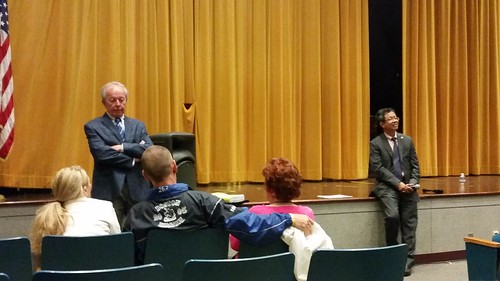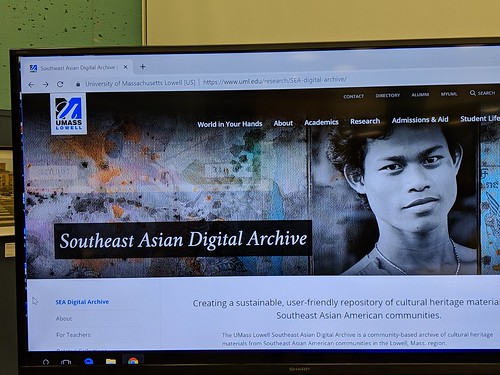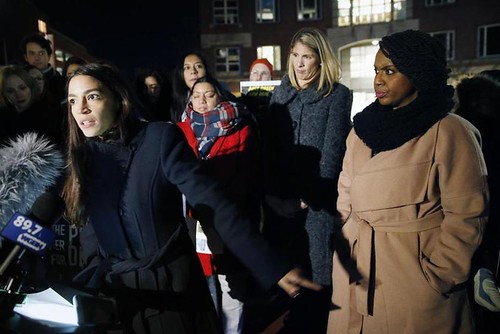Lowell Week in Review: December 9, 2018

Councilors Ed Kennedy & Vesna Nuon
Blockbuster Council Motion Tuesday
Most Lowell City Council motions are noncontroversial, but every so often one with far-reaching implications is served up. Such will be the case Tuesday night when councilors take up a joint motion by Vesna Nuon and Ed Kennedy. The motion requests the City Manager to “encourage the City Solicitor to engage in mediation with plaintiffs currently scheduled for December 18, 2018 in a good faith effort to resolve the lawsuit in a timely and reasonable fashion which resolution should include a proposed modification of the city’s existing electoral system from an at large system to a hybrid district and at large system.”
Here’s what that means, translated from motion-speak:
There is a lawsuit now pending against the city of Lowell in the U.S. District Court in Boston by a dozen Lowell citizens who allege that the city’s method of electing city councilors in which all nine are elected by a majority vote of all the registered voters of Lowell violates the Federal Voting Rights Act of 1965 by diluting the vote of minority residents of the city.
At one level, “majority rule” sounds like a fair system and, if the election was for only a single seat (an elected mayor, for example), it would be fair. But the plaintiffs allege that where every seat in every election always goes to the majority, then the minority has no meaningful say in the outcome of the election. This, the plaintiffs claim, violates the Voting Rights Act.
This case has been pending in court for more than a year. A week from Tuesday, the parties are scheduled to participate in mediation in an attempt to settle the lawsuit. If it is not settled, the case will go to trial sometime in 2019.
At about the same time as this court case was filed, the city council created an ad hoc subcommittee to study the city’s method of electing councilors. That subcommittee is chaired by Vesna Nuon and its two other members are Ed Kennedy and John Leahy. Since its formation, the subcommittee has held numerous public ‘listening sessions’ around the city at which members of the public have been given the opportunity to share their opinions of the city’s method of electing councilors with the members of the subcommittee.
According to the agenda online for this coming Tuesday’s council meeting, the subcommittee will share its final report during the subcommittee reports section of the agenda.
While we don’t know for sure what the findings and recommendation of the subcommittee will be, the related motion (cited above) by two of its members, gives a good indication of what the two of them will recommend to the full council.
That suggestion – in the form of their joint motion – is to adopt what’s called a “hybrid” system of election which would feature some combination of councilors elected at-large (meaning, elected by the entire city) and district councilors (meaning, those councilors would only be elected by the residents of their designated district).
Hypothetically, that could mean three at large councilors and six district councilors, each representing one of the city’s neighborhoods: Acre/Downtown; Belvidere; Centralville; Pawtucketville; Highlands; South Lowell. Or, there could be four at large councilors and five district councilors. Whatever number of districts were decided upon, they would have to be relatively equal in the number of residents in each of the districts. And to resolve the lawsuit, I think care would have to be taken not to fragment the city’s minority neighborhoods into multiple districts. Other than that, there would be much flexibility in determining the boundaries and numbers of the districts.
Procedurally, I believe there are methods by which the council, perhaps in conjunction with the state legislature and governor, could make this change without resorting to a referendum. I say that because putting this kind of change to a citywide referendum would not only ensure its defeat (why would the small percentage of residents with the power to elect all nine councilors in every election vote to give up that power?), it also would ensure that the lawsuit went to trial with the city facing the risk that a Federal judge would decide on how councilors should be elected in the future.
So if this motion comes to a vote on Tuesday night, any councilor who takes the position that he or she would only support a change if “the people” can vote on that change is really saying to leave things as they are.
While we are not sure where most of the councilors now stand on this issue, thanks to Lowell Votes and its 2017 Election Guide, we know how the nine city councilors felt about it a year ago. Here’s the question that was asked each of the 18 council candidates in the 2017 Guide:
Do you support changing Lowell’s at-large system, in view of the pending lawsuit against it?
YES, answered four of the councilors:
Rodney Elliott – “Yes, I brought this to the forefront a year ago by bringing this to the city council. I feel it will benefit the city and better represent our population and neighborhoods.”
Karen Cirillo – “I do. Lowell should move to a hybrid system, with members who run by district and at-large, like in Worcester. I love the diversity of Lowell and the contributions that all Lowellians bring. The city governance should reflect this diversity to better respond to the needs and concerns of all.”
David Conway – “I do believe that we need to bring all of our citizens to the table. Government is not for the few . . . it needs to represent everyone. I would support a hybrid system that could comprise of a combination of district and at large.”
Vesna Nuon – “It is time to make our government more reflective of the communities it serves. Everyone who calls Lowell home should have a say in decisions that impact their lives. A representative who lives on one’s neighborhood, who understands its unique needs and culture, will ensure that its voices are heard.”
MAYBE, answered four more of the councilors:
James Milinazzo – “I support the ad hoc committee. The small percentage of minorities elected/appointed (3%) is well below the percentage of minorities in Lowell. We need to ensure that minority groups feel represented/involved. Communities have changed at-large systems to be more inclusive. Lowell may need to do so.”
Edward Kennedy – “Worcester is a Plan E city that has had a city council comprised of a mix of at-large and district city councilors. I would be open to changing the makeup of the Lowell city council to include such a mix if the city council subcommittee concludes it would improve neighborhood representation.”
John Leahy – “I am willing to listen. I like the system we have now, but maybe we need term limits instead, or maybe we need both. Change is always good.”
William Samaras – “Government works best when it is reflective of the people that it represents. I will support any changes, whether through district representation or some other well-though plan, that would create more opportunities for a more representative council or board.”
NO, answered one councilor:
Rita Mercier – “Personally, I like the Plan E form of government. I know of no discrimination. Put this issue on the ballot and let people decide and I will abide by it. Unlike Cawley or LHS, people’s choice on ballot is too late.”
My own opinion is that the council should make the change. My primary reason for supporting the change has to do with election turnout. There are now about 60,000 registered voters in Lowell. In the state election held last month, 25,469 of them voted (43%). In the 2016 presidential election, 36,783 people voted (57%).
Compare the turnout in those two elections to participation in the last two city council elections. In 2017, even with the intense “location of the high school” issue on the ballot, only 13,916 people voted. In the 2015 city election, just 10,714 people voted (18%).
So why is it that twice as many people vote in a state election as in a city election and three times as many vote in a presidential election as in a city election? One reason is that many of our residents feel disconnected from local government. Perhaps by having (some) city candidates run in a much smaller district than in the entire city, candidates and campaigns will be more grass roots in their focus and residents in the neighborhoods with low or no city councilors living in them will feel more connected to local government and therefore will be more inclined to participate.

Southeast Asian Digital Archive
This past Tuesday was the official launch of the Southeast Asian Digital Archive at UMass Lowell. SAEDA, as the archive is called, is a community-based archive that seeks to document the histories of Southeast Asians living in Lowell and vicinity. It is a partnership between the UMass Lowell Center for Asian American Studies, the UMass Lowell Libraries and a number of community-based organizations.

Phitsamay Uy, Tim Thou, Jacquie Moloney, Sue Kim
Sue Kim, the Associate Dean of Undergraduate Studies for the Faculty of Arts and Sciences, and Phitsamay Uy, an Associate Professor in the School of Education, who are also co-directors of the Center for Asian American Studies and of SAEDA, gave welcoming remarks. Uy emphasized that Southeast Asians first came to Lowell forty years ago as refugees from the Killing Fields of Cambodia, the secret war in Laos, and the Vietnam War, but their stories have yet to be documented. That is one of the purposes of this archive.
UMass Lowell Chancellor Jacquie Moloney also spoke – with a great deal of passion. In the early 1980s, she worked at the Indochinese Refugee Foundation which was located at 79 High Street in Lowell, one of the first organizations to help settle newly arrived refugees into the community. Moloney, who was introduced as “one of the unsung heroes of the Southeast Asian experience in Lowell” explained that her work with the Foundation “changes my life forever.” She said it taught her about the challenges that people in other parts of the world face, and added that “how Lowell responded to the influx of Southeast Asian refugees cemented my love for Lowell and taught me that communities can make a difference.”
After Mayor William Samaras spoke, Councilor Vesna Nuon, himself a refugee from Cambodia, gave personal testament to the importance of this archive, explaining that Southeast Asians who endured the trauma of the Killing Fields and resettlement “don’t want to talk about it.” Consequently, few in Lowell know the story of why the Southeast Asians are here. Nuon said it is important to preserve this story so that those who come after us can learn it and learn from it.

Boston Globe photo (Alexandria Ocasio-Cortez, Lori Trahan, Ayanna Pressley
Congresswoman Trahan goes to Washington (and Cambridge)
Lori Trahan didn’t get much of a break after winning the November 6 election for the Third Congressional District seat. It seems she’s been back and forth to Washington several times; I’ve seen her at a number of local civic and political events; and last week she went back to school, attending the biennial orientation for newly elected members of Congress at the Harvard Kennedy School.
But Trahan didn’t spend all of her time in Cambridge inside a Harvard meeting room, something I learned when I read a story by Nestor Ramos in Wednesday’s Boston Globe which began as follows:
CAMBRIDGE – If you’re going to be an outsider, sometimes you have to spend some time outside. And so, as an orientation program for new members of Congress was getting started inside Harvard’s Kennedy School on Tuesday night, Lori Trahan was shivering in the freezing cold. Ayanna Pressley stuffed her hands into her pockets. Someone offered Alexandria Ocasio-Cortez a hat.
The three newly elected members of Congress, along with their incoming colleagues Andy Levin and Rashida Tlaib (both of Michigan) joined a group demonstrating in support of universal health care and demanding a better response to climate change.
Ocasio-Cortiz and Pressley have become the most recognizable members of several dozen newly elected progressive Democrats who see their respective elections as a mandate for change, not only of current government policies but also of the traditional way of doing things in Washington.
I was thrilled to see my incoming member of Congress in the midst of this group because at this point in history, it’s the right place to be. However, Trahan’s participation in this small demonstration and her association with her change-seeking colleagues might be looked at less enthusiastically by the conservative voters of the Third Congressional District (not to mention the even more conservative mainstream media outlets in the district). For that reason, those of us who believe that aggressive rather than incremental change is needed in Washington should do whatever we can to show our support for Congresswoman-elect Trahan, especially when she takes up issues like expanding health care coverage and combatting climate change.
Universal health care coverage is not financially feasible for our country. We are about 22 trillion dollars in debt. By having universal Healthcare,will increase that debt even further. There were no comlaints about healthcare until this idea was proposed. Now it is a big deal ,and for what and why? Your progressive ideas will ruin our country, not make things better. Battling climate change is going to be difficult at best, because there are two side to the arguement, but the president should not open our Alaskan National Park, to oil drilling. The environmental damage will be significant, and ruin the pure beauty and openness of that area. Also I am against lifting a ban on endangered species, andcoal companies being allowed to pollute water,and coal generation power plants not being made to have an recycling system for the exhaust fume from burning cosl. Theread should be a recovery system installed at all cosl fired power plants to keep pollutants out of the air. I am an Independent conservstive, but I also believe in a clean environment.To do anu thing radical ,will not work. You all must work to gradually make changes, but as far as hunting endanger ed species, that should not be allowed .